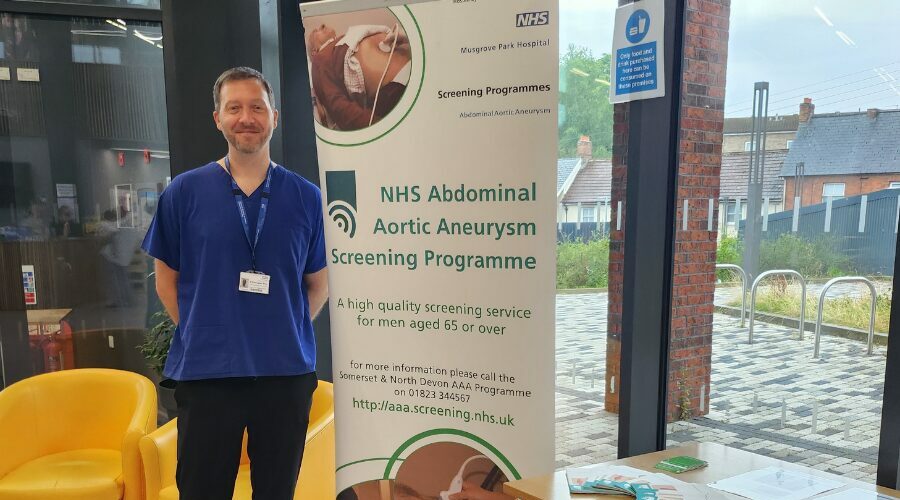
Spotlight
Our colleagues offer life-saving screening to local men’s communities
For lots of older men working in industry or large factories, having an abdominal aortic aneurysm (or AAA for short) screening appointment may not be at the top of their ‘to do’ list.
Although the NHS writes to every man who reaches the age of 65 to book an appointment, many of those who work in these large establishments, often many miles away from their home, can either mislay their letter, or it may not even get forwarded on to them.
But with symptoms of AAA largely undetectable, our screening programme team have been going out to large employers, Numatic in Chard and Hinkley Point C in Bridgwater, to raise awareness of potentially life-saving screening.
Bryan Shenington-Price, one of our AAA screening practitioners, explains: “Most people have no idea what AAA screening is, and if I’d have a pound for every time someone tells me it’s something to do with Alcoholics Anonymous then I’d be a rich man!
“The national screening programme is run throughout England and Wales, where every man who reaches the age of 65 gets an automatic invitation for a scan.
“One of the reasons the national screening programme was commissioned is because AAA is a life-threatening condition, and although it tends to be symptomless, it can grow over time.
"A person may have an aneurysm without experiencing any symptoms and unfortunately, by the time symptoms appear, it can already be too late to prevent a life-threatening emergency.
“Our screening programme, which covers the whole of Somerset and North Devon, has a really good uptake rate, and we’re usually within the top three performing programmes in the country with around 88% of patients usually attend their appointments.
“From our perspective, we’re focusing on reaching those who either haven’t made a choice yet or may not be fully aware of the options available to them.
“The reason the national programme doesn’t screen women is because men are six times more likely to have an aneurysm in that area of the body.”
The team chose to visit Numatic and Hinkley Point C because those workplaces have a large majority of male workers, and they also experienced a real success with a similar visit to Hinkley Point B in the past.
Lorna Hewart, our AAA screening programme service manager, adds: “AAA screening doesn’t have the same level of public recognition as other screening programmes, such as breast, cervical, or bowel screening, which all tend to have a much higher profile.
“Our screening programmes target men of very specific ages – those who are over 65. It’s simply a one-off scan and then they’re discharged from the service, unless an aneurysm of three centimetres or more is detected.
“Hinkley Point, in particular, tends to have a workforce that travels around different power stations to carry out maintenance work, so they have a long period away from home, and then they might move on to the next power station, which means they’re quite likely to miss invitations to have their screening.
“On the whole the sessions at Numatic and Hinkley Point C were well received, as well as our trips to leisure centres and other large locations.”
The success of the visits was echoed by feedback from colleagues at the two employers.
The wellbeing officer at Numatic said: “It was great to have your expertise on site, and I have no doubt that your message landed with the audience.”
The occupational health and wellbeing manager at Hinkley Point C said: “Thank you so much for supporting our Zero Harm week by carrying out the aortic aneurysm testing, it was very much appreciated.”
Lorna continues: "Sometimes we’re not speaking directly to the 65-year-old men who need to be screened, but rather to their children, partners, or loved ones. By raising awareness more widely, we can reach them through these indirect routes and help ensure more people get the screening they need.
“The presentation we gave at Numatic generated a lot of interest and we’ve also been to some men’s sheds and talking cafes through village agents. The feedback tends to be that they weren’t aware of it, so they’ll give us a call, which is great.
“We’ve also done quite a lot of structured visits to various homeless charities too, and we have more coming up shortly. This is all about trying to target those groups of people who would otherwise find it difficult to attend medical appointments.”
Bryan adds: “Just over one in 100 men scanned have an aneurysm they didn’t know about. While a small aneurysm is usually safe, requiring only monitoring, if it grows, it could become a problem, and may need an operation to repair it.
“Generally, we find that the risks of a large aneurysm rupturing, against the risk of surgery, tips a balance in favour of surgery.”
If men don’t attend two appointments in a row, they are taken off the list for an appointment, but the service is always open for self-referrals.
Lorna continues: “It may not have been the right time for them to attend, but we want people to know that our service is still here when they’re ready.
“Our message to men who are 65 or over who haven’t had a scan before is to please get in contact with us, as we can book you in for an a quick screening appointment – just email sandaaa@SomersetFT.nhs.uk or call 01823 344567.”
The appointments usually take place at local GP surgeries or community hospitals and just involves a quick, painless ultrasound scan with a bit of gel on the tummy.

